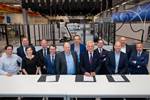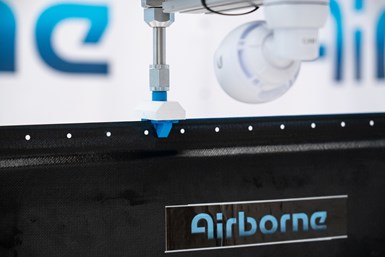Cotesa GmbH selects Airborne to supply a fully automated edge sealing system
The robotic production system will automate Cotesa’s edge sealing operations for complex, 3D composite parts for the automotive and aerospace industries on-the-fly, while also maintaining accurate resin dispensing.
Cotesa GmbH (Mittweida, Germany), a manufacturer of high-quality composite fiber components for aviation and automotive engineering, has selected Airborne (The Hague, Netherlands) to supply a robotic production system to automate its edge sealing operation for complex, 3D composite parts. Airborne says its Automated Edge Sealing system ensures constant quality during production and significantly reduces the amount of manual labor. The system uses the company’s Automated Programming technology, which automatically translates the 3D part design directly into the machine instructions and process settings without the need of robot programming.
“This system will help Cotesa to streamline operations and increase quality to better serve its customers,” Christian Bartsch, CEO of Cotesa, says. “The edge sealing process has been a difficult process for many years, so we are happy that Airborne can help us in making it more efficient and safer.”
In many aerospace programs, Airborne notes, it is mandatory to seal the edges of composite parts after they have been machined into the right shape. This sealing prevents moisture ingress in the edges that otherwise would be exposed to the environment. Edge sealing is, in almost all cases, still a manual process that leads to quality problems which result in rejected parts or repair work, as well as fatigue to workers because of the tedious, repeated motion.
One of the hurdles of automating this edge sealing process, according to Airborne, are the variety of part shapes to be sealed. The 3D geometry of every part is different, there can be thickness variations in the edge and the edges can be chamfered. In addition, any holes inside the part need to be sealed. This high variation in geometries leads to a large effort in robotic programming, if traditional methods are followed, which can be prohibitive for the use of automated edge sealing.
Airborne says it successfully uses Automated Programming in all its machines. The software takes the design and material input, and translates this via an advanced algorithm into the correct robot motions and process parameter settings. Moreover, Airborne is levering its experience with automated honeycomb potting to address accurate dispensing of the resin. The dispensing system can handle the variations in part shapes and ensures that the edge is sealed within the required tolerances.
Airborne looks forward to supporting the automation of the edge sealing operation at Cotesa, Marcus Kremers, CTO of Airborne, notes. “Edge sealing is not an easy process to automate and qualify in the aerospace industry, so we are delighted to be able to work with the Cotesa team who are very knowledgeable and experienced in bringing innovations to the aerospace market,” Kremers says. “It will be a great opportunity to bring this technology to the shop floor and make it happen.”
Related Content
-
Plant tour: BeSpline/Addcomp, Sherbrooke, QC, Canada
Composites automation specialist increases access to next-gen technologies, including novel AFP systems and unique 3D parts using adaptive molds.
-
Airborne delivers composite upper stage tank for EU ENVOL project
Nine-member consortium targets development of low-cost, green vertical orbital launcher with manufacture of an ultra-lightweight composite tank design in an automated manufacturing environment.
-
Babyark launches smart, composites-intensive car seat
Impact-absorbing car seat approaches safety holistically with carbon fiber and D3O materials and embedded sensors for real-time monitoring.












.jpg;maxWidth=300;quality=90)



